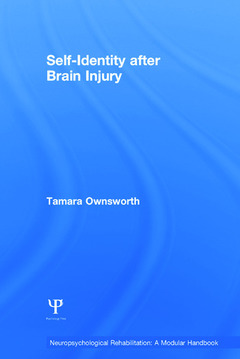Self-Identity after Brain Injury Neuropsychological Rehabilitation: A Modular Handbook Series
Auteur : Ownsworth Tamara

An injury to the brain can affect virtually any aspect of functioning and, at the deepest level, can alter sense of self or the essential qualities that define who we are. In recent years, there has been a growing body of research investigating changes to self in the context of brain injury. Developments in the cognitive and social neurosciences, psychotherapy and neurorehabilitation have together provided a rich perspective on self and identity reformation after brain injury. This book draws upon these theoretical perspectives and research findings to provide a comprehensive account of the impact of brain injury on self-identity.
The second half of this book provides an in-depth review of clinical strategies for assessing changes in self-identity after brain injury, and of rehabilitation approaches for supporting individuals to maintain or re-establish a positive post-injury identity. The book emphasizes a shift in clinical orientation, from a traditional focus on alleviating impairments, to a focus on working collaboratively with people to support them to re-engage in valued activities and find meaning in their lives after brain injury.
Self-Identity after Brain Injury is the first book dedicated to self-identity issues after brain injury which integrates theory and research, and also assessment and intervention strategies. It will be a key resource to support clinicians and researchers working in brain injury rehabilitation, and will be of great interest to researchers and students in clinical psychology, neuropsychology, and allied health disciplines.
1. Overview of self-identity after brain injury 2. What is the self? Historical and contemporary accounts 3. Introduction to brain injury and consequences during childhood and adolescence 4. Psychological adjustment and self-identity changes after brain injury 5. Approaches for assessing changes to self after brain injury 6. Individual psychotherapy and neurorehabilitation approaches 7. Group and community-based interventions 8. Family and paediatric Interventions 9. Summary and future directions
Tamara Ownsworth is a teaching and research academic in the School of Applied Psychology at Griffith University in Brisbane, Australia, with 18 years of experience as a clinician and researcher in the brain injury field. She is also a chief investigator on the NHMRC Centre of Research Excellence in brain recovery.
Date de parution : 03-2014
15.6x23.4 cm
Date de parution : 03-2014
15.6x23.4 cm
Thème de Self-Identity after Brain Injury :
Mots-clés :
paediatric; severe; tbi; social; neuroscience; childhood; family; system; interventions; neuropsychological; Aphasia Communication Group; Poor Long Term Functional Outcome; Acquired Brain Injury; Brain Injury; CBT Approach; TBI Sample; Cent TBI; CBT Intervention; Cognitive Linguistic Impairments; Self-care Self-efficacy; ICF Framework; Neurorehabilitation Approaches; Mild TBI; Involving Family Caregivers; Severe TBI; ICF Checklist; Brain Injury Support Groups; Gas; Paediatric Brain Injury; Brain Injury Rehabilitation; Poorer Memory Function; Childhood Brain Injury; Visual Analogue Self-Esteem Scale; Lower Premorbid IQ; PBS Intervention



